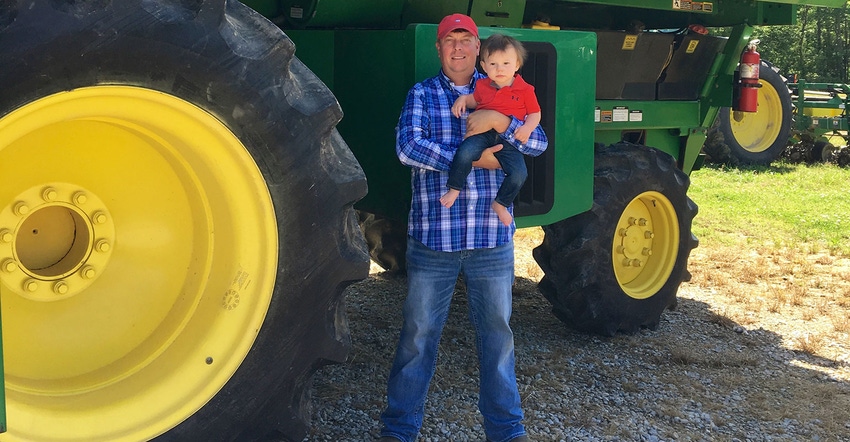
For Jason Tindall, a Eupora, Miss., native, farming is a family affair. Tindall found that farming was his career path at 12 years old, when he began farming alongside his father, brother and uncle.
“I knew when I graduated high school I wanted to start farming on my own,” he said. “I’ve now been farming for about 20 years. I started out with only 200 acres, but I now farm close to 2,000 acres, 600 of which I own.”
Currently, Tindall is farming 1,500 acres of cotton and 300 of corn on land in Choctaw, Montgomery, and Webster counties. While he’s planted other crops such as soybeans, like his father, cotton is his crop of choice.
“Cotton has kept my and my family’s farms going for the past several years,” he said.
Known as the staple fiber of the South, cotton’s major pest for decades was the boll weevil, now a thing of the past. Worms, too, are no longer such a threat thanks to the new Bt technology. Tindall said the main risks to his crops now are chemical resistant weeds and feral swine.
“The Roundup Ready genes allow us to spray Roundup over the top, so we no longer have to fight grass problems and other broadleaf weeds, which is a big plus,” he said. “However, we are now seeing resistant weeds. That’s really our next big issue.”
For this production year, Tindall’s main concern is the setbacks from the weather.
Excess rainfall
“It’s going to be tough this year to get the seeds in the ground on time with excess rainfall,” he said. “One of the biggest disadvantages of planting cotton after May 25 is you start losing crop insurance, and if the growing season is not perfect, you hope to at least break even for the year.”
He’s committed to conservation and uses wheat as a cover to combat erosion, a serious threat with excessive precipitation. Wheat suits his land and protects soil from erosion during winter and spring rainfall. Tindall sees a positive difference in the yield of crops he plants following a cover crop.
Despite his extensive acreage, Tindall farms with a small crew of workers and during harvest season, his family shares the load.
Kayla, Tindall’s wife, said, “During the time to pick cotton, the whole family works together. There are three different owners, but depending on whose field they are working, the others act as the workers for that day. Together, they get the job done one field at a time.”
Through the help of his family and the wisdom of his father, who has been farming for about 40 years, Tindall has added to his farming operation yearly.
In addition to help from family, he has two full-time workers. Kayla said Tindall is, in a way, a one-man show.
“He does it all,” she said. “From equipment maintenance to being out in the fields spraying weeds, he does everything.”
Equipment repairs
“When there is a breakdown or repair needed, I do most of the work on the equipment myself,” Tindall said. “It helps to keep the cost down, knowing how to repair my own equipment.
“I still have a lot of help from my sales agent, Kevin Mabry, who works for Sanders. Kevin helps me get the right fertilizer and seed for my fields, and if I have a problem with my crops, he is always there to help, whatever the need may be.”
All his equipment is John Deere, and he uses GPS technology.
As far as picking cotton, Tindall likes to keep things simple.
“We’ve kept it old school; I use four basket pickers with module builders and boll buggies, nothing too fancy, but I use good reliable equipment,” said Tindall.
“You need determination in this business since input costs are high and commodity prices are low, but hard work pays off.”
Jason has two daughters, Christen and Sophie, and one son, Jase, who is almost a year old.
“Who knows, maybe Jase will want to farm one day,” said Tindall. “We hope as he gets older, he will become interested in the business.”
About the Author(s)
You May Also Like




